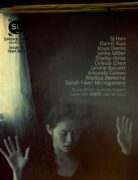I.
Here is your story so far. A beautiful woman lives in a coastal village and goes out in search of work but no one will hire her. She asks the shopkeepers who line the pier, and they smile and look her up and down and say, Work? Forget about work. Come around here, darling. Come behind the counter where we can talk about you. She tries the back streets instead, her feet aching, and finally finds an empty, musty puzzle shop owned by an old blind man. He hires her immediately. Maybe he’s lonely.
She cleans the filthy floors, organizes the shelves, adds labels and price tags. No one comes in to shop. Near the end of the day, in the storage room, she stumbles upon a rectangular wooden bin, spanning the entire length of the man’s workbench and filled with thousands of puzzle pieces. On the far left, the pieces are rubber-banded into sorted piles, ready to be returned to whatever jigsaw puzzle once orphaned them. In the middle, no piles, but the pieces have been vaguely grouped together by color or design, like slashes of paint in a watercolor. And on the right, a sea of chaos. It must have taken the old man years to sort through the pieces so far, the woman thinks, and it will be many more before he finishes the rest. Then, of course, she realizes that the old man will never finish—he’s gone blind. The gradual decline of this bin’s organization mirrors his slow surrender of his own sight.
In that moment, she feels. Feels what? Sadness, pity, regret—none of these come close to what you’re trying to express at the end. But what does? What are the words for this unknown thing? If they exist they are hiding from you, under the floorboards, within the walls. Hmm. You get up and take a snack break.
II.
The woman is no longer beautiful; now she is frighteningly ugly, and the shopkeepers on the pier wrinkle their noses and laugh before she can even inquire. This time, when the old blind man hires her, she promises to find a way to repay his kindness. She comes across the wooden bin and decides she will help the man by sorting the rest of the puzzle pieces herself. She packs them up in a cloth bag and takes them with her.
But on her way home, she is accosted by two boys loitering on the boardwalk. They are teenagers, terrified of the new hidden power women seem to hold over them, and deeply angry that they are afraid. Now they see a woman who is perfectly unthreatening in all her ugliness, and so they leap off the railing of the boardwalk and holler and chase her like hyenas. She runs across the pier but loses her footing and topples into the water. The bag slips out of her hand. The boys cackle.
By the time she gets home she is shivering and humiliated, her clothes melting into saltwater slime. The pieces are long gone, stolen by the sea. She stands dripping before her mirror, looking down at her empty hands, beholding everything she has lost. And here you’ve come to it—for what, exactly, has she lost? The pieces, yes, but the story is about more than just the pieces. It’s also about the store, redolent with sadness, and the old lonely man, and—what? You don’t quite know, you’ve only got a shadowy outline of it. Maybe the problem is you’ve taken the woman on an erroneous path, back to her home, when she should have stayed in the store with the man. Or is it something else? You have a headache. You need a good long walk.
III.
All right. She’s beautiful again. But the man is no longer blind (as if men must be blind in order to be decent to beautiful women), and he no longer runs a puzzle shop (you’ve already forgotten why it was puzzles in the first place), and this time when the woman finds the wooden bin (which you must now fill with something new), she looks up and sees the man watching her, across the room. The two of them study each other’s expressions, the world as seen through the eyes of another. She says to him—what? No. She remains silent, but thinks—what?
No. It doesn’t matter how you change the rest of the story—the ending falls apart, and you’re starting to believe it always will. And yet sometimes, when you’re sitting alone in the bathtub or lying in bed waiting to fall asleep, you think (you’re not sure, but you think) that you have a distant, dreamlike sense of how the end should go, like a flash of smoke at the edge of your sight, sure to vanish if you stare at it directly. A glimpse just long enough for you to understand the depth and degree to which you lack understanding. Maybe the beautiful woman stumbles upon the bin and the ugly woman stands dripping before her mirror and the man and woman in the not-puzzle shop study each other’s expressions, and maybe they don’t, but either way the part that’s killing you is the what, the what the what the what, and without that you have nothing. And yet there is that smoke, drifting out of reach. Grasp for it. Try some similes—why not? Like the moment a snowflake lands on your skin before it melts. Like attempting to remember a face from ten years ago. Like holding some tiny newborn creature in your palm, feeling its warmth and its sudden and urgent heartbeat, watching it gasp for air. Knowing nothing about it except that it’s yours. You can nurture it, as best you can. You can see it free in the wilds. You can take your thumb and your fingers, curl them around tight, press your knuckles together, and squeeze. Pop. The end.



 The SmokeLong Grand Micro Contest (The Mikey) is now an annual competition celebrating and compensating the best micro fiction and nonfiction online.
The SmokeLong Grand Micro Contest (The Mikey) is now an annual competition celebrating and compensating the best micro fiction and nonfiction online.